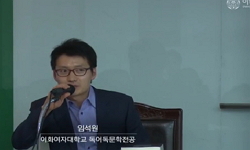조선후기 성리학에 있어서의 主體와 他者의 문제를 언급하는 것은 당시 國家觀과 함께 대외 관계의 關係性을 정의하는 것이라고 할 수 있다. ‘나’를 중심으로 ‘타자’를 어떻게 이해하...
http://chineseinput.net/에서 pinyin(병음)방식으로 중국어를 변환할 수 있습니다.
변환된 중국어를 복사하여 사용하시면 됩니다.
- 中文 을 입력하시려면 zhongwen을 입력하시고 space를누르시면됩니다.
- 北京 을 입력하시려면 beijing을 입력하시고 space를 누르시면 됩니다.
https://www.riss.kr/link?id=A82622140
-
저자
李美林 (성균관대학교)
- 발행기관
- 학술지명
- 권호사항
-
발행연도
2008
-
작성언어
Korean
-
주제어
성리학 ; 주체 ; 타자 ; 화이론 ; 이기론. Confucianism ; Subject ; Other Person ; Theory of China ; Theory of Predisposition of Nature
-
등재정보
KCI등재
-
자료형태
학술저널
- 발행기관 URL
-
수록면
217-248(32쪽)
-
KCI 피인용횟수
1
- 제공처
- 소장기관
-
0
상세조회 -
0
다운로드
부가정보
국문 초록 (Abstract)
조선후기 성리학에 있어서의 主體와 他者의 문제를 언급하는 것은 당시 國家觀과 함께 대외 관계의 關係性을 정의하는 것이라고 할 수 있다. ‘나’를 중심으로 ‘타자’를 어떻게 이해하는가에 따라서 ‘타자’에 대한 대응의 형태가 결정되기 때문이다. 理氣論과 華夷論을 중심으로 한 성리학적 대응 이론은 많은 논란에도 불구하고 한국사회에서 자생적으로 변화의 힘에 대한 대응책의 논리적 근거를 세웠다는 점에서 그 의의가 있다고 하겠다. 혼란했던 시기에 먼저 ‘주체’와 ‘타자’에 대한 인식을 분명히 함으로써 정체
성을 다지고, 그것을 바탕으로 對국가간의 관계를 설정해 나간 것이다.
당시의 華夷論(尊周論)은 멸망한 明나라에 대한 義理論인 동시에 무너진 동아시아문화질서를 정신적으로나마 유지하려는 것으로, 무력에 굴복하지 않을 수 없었던 現實에서 文化的 價値를 希求하는 朝鮮社會의 願望의 표출 이기도 하였다. 人倫과 道德을 지키는 儒敎文化를 갖고 있는 存在를 中華(主體), 그렇지 못한 존재를 夷狄(他者)이라고 분별하는 性理學的 名分論인 것이다. 이러한 華夷論의 논리는 그 확고한 名分論的 價値를 가지고 民族的 자부심을 고취시킴과 동시에 정체성을 명확히 다지는 논리로 역할되어 졌다. 대외인식의 한 방법론으로써의 華夷論과 理氣論의 논리전개는 조선후 기사의 성리학이론전개에 있어서 많은 점을 시사해 준다. 관념적이고 사변적이라고 일컬어지던 성리학이 어떻게 현실을 인식하고 대응했는가의 문제는 그것의 잘잘못을 가리는 것이 아니다. 조선후기 사상사의 거대한 한 줄
기로써 그 끈을 놓아버리지 않고, 끝까지 외세에 대한 치밀한 분석과 논증를 통해 대항하려 했다는데에 의미가 있다고 하겠다. 또한 華⋅夷의 구분을 <華가 되는 주체로써의 ‘나’>와 <夷가 되는 타자로써의 ‘너’>를 분명하게 나누어 보여줌으로써 당시 조선후기에 있어서 主體와 他者의 개념을 통한 성리학적 인식론을 명확히 하였다는 것을 알 수 있다
다국어 초록 (Multilingual Abstract)
Mentioning the issue of a subject and an object in the Confucianism in the late Joseon Dynasty can be said to define the relationship of then view of a nation and foreign relations. How to understand 'the object' focusing on 'me' depends on the form o...
Mentioning the issue of a subject and an object in the Confucianism in the late Joseon Dynasty can be said to define the relationship of then view of a nation and foreign relations. How to understand 'the object' focusing on 'me' depends on the form of facing 'the object'. Confucian coping theory focusing on the theory of the predisposition theory of nature, and the theory of China and savages brought forth many controversies, but it can be said to be significant in
that it laid the logic foundation of a countermove to the power of change spontaneously. By defining the perception of 'a subject' and 'an object' in the chaotic age, it solidifies its identity, and sets a relation to nations based on that. This is the concept of Confucian perception of a nation, which becomes an important rule to understand the history of thinking in late Joseon.
Then theory of China and savages was a theory of obligation to Dynasty Ming, and to sustain the ruined East-Asian cultural order even in aspect of mentality. In the reality to submit to military power, it was the expression of a burning desire of Joseon Society hoping for cultural value. It is a Confucian theory of moral obligations distinguishing the existence of Confucian culture
keeping human morality and morals as China(subject), the other existence as savages(the other person). Such logic of the theory of China and savage has been played a role to enhance national pride with its definite value of moral obligations, and lay the foundation of its identity. Logical development of the theory of China and savages and that of predisposition of nature as one method of perceiving loyalty provides a lot of hints in developing the Confucian theory
in the history of late Joseon Dynasty. The question of how Confucianismreferred to as ideological and speculative perceived and dealed with the reality is not to discriminate between right and wrong. It can be said to be significant in that it didn't let its string go as the grand vein of the thinking history of late Joseon Dynasty, and tried to face the outside influence to the end through finely worked-out analysis and demonstration. Also it can be found that discriminating
China and savages showed definite division of <'I' as the subject of China> and <'You' as the other person of Savages>, and cleared up Confucian theory of perception through the concept of the subject and the other person in late Joseon Dynasty.
목차 (Table of Contents)
- 논문요약
- Ⅰ. 緖論
- Ⅱ. 理氣論的 根據
- 1. 理氣의 槪念과 位階
- 2. 理先氣後
- 논문요약
- Ⅰ. 緖論
- Ⅱ. 理氣論的 根據
- 1. 理氣의 槪念과 位階
- 2. 理先氣後
- 3. 理의 主宰性 强化
- Ⅲ. 主體의 他者에 대한 認識과 展開
- Ⅳ. 結論
- 참고문헌
- Abstract
참고문헌 (Reference)
1 금장태, "화서학파의 철학과 시대의식" 태학사
2 한국철학사연구회, "한국실학사상사" 다운샘
3 이재석, "척사위정론에 관한 연구" 한국정신문화연구원
4 정옥자, "조선후기 중화사상연구" 일지사
5 조성산, "조선후기 성리학 연구의 현황과 전망" 창작과 비평사
6 최영진, "조선조유학사상의 양상" 성균관대 출판부
7 강대덕, "華西 李恒老의 民族主義 思想硏究" 강원대
8 금장태, "東西交涉과 近代韓國思想" 성균관대 출판부
9 오석원, "春秋의 華夷思想과 韓國의 民族意識"
10 "『華西雅言』,? 『朱子文集』,? 『中庸』,? 『論語』,? 『孟子』"
1 금장태, "화서학파의 철학과 시대의식" 태학사
2 한국철학사연구회, "한국실학사상사" 다운샘
3 이재석, "척사위정론에 관한 연구" 한국정신문화연구원
4 정옥자, "조선후기 중화사상연구" 일지사
5 조성산, "조선후기 성리학 연구의 현황과 전망" 창작과 비평사
6 최영진, "조선조유학사상의 양상" 성균관대 출판부
7 강대덕, "華西 李恒老의 民族主義 思想硏究" 강원대
8 금장태, "東西交涉과 近代韓國思想" 성균관대 출판부
9 오석원, "春秋의 華夷思想과 韓國의 民族意識"
10 "『華西雅言』,? 『朱子文集』,? 『中庸』,? 『論語』,? 『孟子』"
동일학술지(권/호) 다른 논문
-
- 동양고전학회
- 최자운
- 2008
- KCI등재
-
- 동양고전학회
- 임헌규
- 2008
- KCI등재
-
- 동양고전학회
- 崔英成
- 2008
- KCI등재
-
- 동양고전학회
- 趙麒永
- 2008
- KCI등재
분석정보
인용정보 인용지수 설명보기
학술지 이력
| 연월일 | 이력구분 | 이력상세 | 등재구분 |
|---|---|---|---|
| 2027 | 평가예정 | 재인증평가 신청대상 (재인증) | |
| 2021-01-01 | 평가 | 등재학술지 유지 (재인증) |  |
| 2018-01-01 | 평가 | 등재학술지 유지 (등재유지) |  |
| 2015-01-01 | 평가 | 등재학술지 유지 (등재유지) |  |
| 2011-01-01 | 평가 | 등재학술지 유지 (등재유지) |  |
| 2008-01-01 | 평가 | 등재학술지 선정 (등재후보2차) |  |
| 2007-01-01 | 평가 | 등재후보 1차 PASS (등재후보1차) |  |
| 2005-01-01 | 평가 | 등재후보학술지 선정 (신규평가) |  |
학술지 인용정보
| 기준연도 | WOS-KCI 통합IF(2년) | KCIF(2년) | KCIF(3년) |
|---|---|---|---|
| 2016 | 0.48 | 0.48 | 0.44 |
| KCIF(4년) | KCIF(5년) | 중심성지수(3년) | 즉시성지수 |
| 0.44 | 0.42 | 1.058 | 0.15 |




 KCI
KCI eArticle
eArticle







